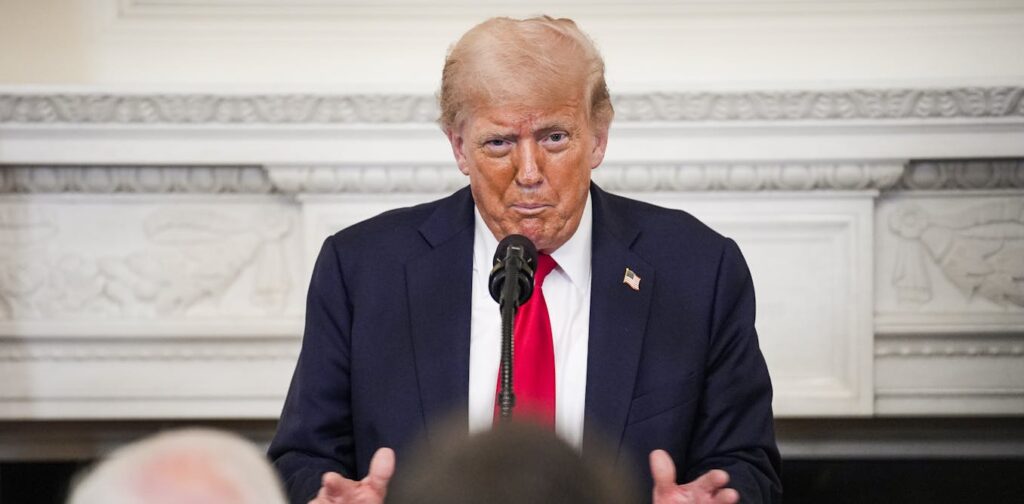
The US president, Donald Trump, recently issued a stern warning to Russia, declaring that Moscow had 50 days to end its military operations in Ukraine or face comprehensive secondary sanctions. These sanctions would target countries continuing to trade with Russia, potentially disrupting global supply chains.
On July 15, Trump described new measures that would impose 100% tariffs on any nation purchasing Russian exports. He warned,
“They are very biting. They are very significant. And they are going to be very bad for the countries involved.”
However, despite the ominous threats, Moscow’s stock exchange saw a 2.7% rise immediately following the announcement, and the Russian rouble strengthened. Global oil markets also appeared unfazed, indicating that traders perceived no immediate threat.
Russia’s Nonchalant Response
This market reaction coincided with a notably calm Moscow. While official statements mentioned the need for time to “analyse what was said in Washington”, other comments suggested that the threats would have little impact. Former Russian president Dmitry Medvedev, for instance, took to social media to declare that “Russia didn’t care” about Trump’s threats.
The positive market response and the lack of panic from Russian officials reveal more than mere skepticism about Trump’s resolve. If investors doubted Trump’s credibility, one would expect market indifference, not enthusiasm. Instead, the reaction suggests that financial markets anticipated a stronger US response. As Artyom Nikolayev, an analyst from Invest Era, remarked,
“Trump performed below market expectations.”
A Reprieve, Not a Threat
Trump’s ultimatum isn’t just seen as non-credible; the positive market reaction in Russia suggests it is a boon for Moscow. The 50-day deadline is perceived not as a cutoff but as a reprieve, allowing nearly two months of assured inaction from the US. This period provides Russia with more time to leverage its military advantages in Ukraine without new economic pressures.
Moreover, Trump’s threat inadvertently undermines more serious sanctions efforts gaining traction in the US Congress. A bipartisan bill proposing far more severe sanctions, including secondary tariffs of up to 500% and limiting the president’s ability to waive them, was advancing. However, after Trump’s ultimatum, US Senate majority leader John Thune announced a delay in voting on the tougher sanctions bill until after the 50-day period, effectively stalling a more credible threat to the Kremlin.
Challenges in US Economic Statecraft
This episode underscores challenges in the US’s use of economic statecraft in international relations. Three key factors undermine the credibility of Trump’s threats:
Trump’s Track Record
Financial markets have grown accustomed to the administration announcing severe tariffs only to later delay, dilute, or abandon them. The term “Taco”, short for “Trump always chickens out”, has gained traction in financial circles. This reputation for not following through means adversaries and markets have learned to expect a high probability of retraction.
Lack of Domestic Accountability
The administration’s credibility is further weakened by a lack of domestic political accountability. Research on democratic credibility in international relations highlights how domestic constraints, or “audience costs”, can paradoxically strengthen a country’s international commitments. When leaders face political repercussions for backing down, their threats carry more weight. However, Congress’s general reluctance to constrain Trump undermines this logic, signaling to adversaries that threats can be made without consequence.
Weak Diplomatic Infrastructure
Effective economic coercion requires a robust diplomatic and bureaucratic apparatus for implementation and enforcement. The systematic reduction of the State Department and the freezing of United States Agency for International Development (USAID) programs have eroded the diplomatic infrastructure necessary for sustained economic pressure. Effective sanctions require careful coordination with allies, which the Trump administration has undermined. Additionally, effective economic coercion requires planning and credible commitment to enforcement, all of which are unattainable without a professional diplomatic corps.
Investors and foreign governments appear to be betting that this combination of presidential inconsistency, lack of domestic accountability, and a weakened diplomatic apparatus renders any threat more political theater than genuine economic coercion. The rally in Russian markets was a clear signal that American economic threats are becoming less feared.
As the situation develops, the international community will closely watch how the US administration navigates these challenges and whether more credible economic measures will be implemented to address the ongoing conflict in Ukraine.







